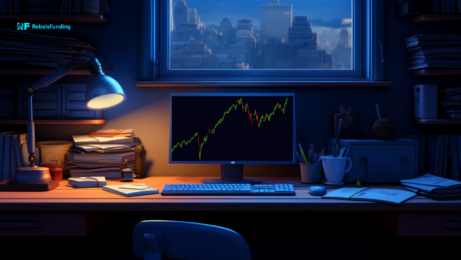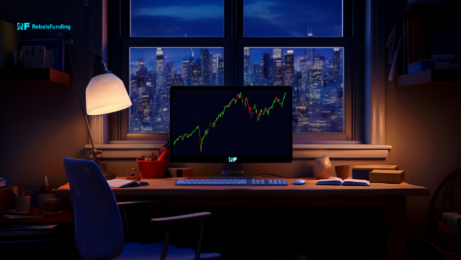5 Signs you’re Revenge Trading and How to Avoid It

Revenge trading is a term used to describe a forex prop trader’s emotional response to a losing trade. Simply put, it’s when a trader makes a trade to get even, rather than following a trading plan. It often happens when a prop trader has suffered a loss and feels the urge to immediately jump back in and recoup those losses.
It can lead to significant financial losses and damage a trader’s mental well-being, creating a cycle of impulsive decisions and further losses. In this blog post, we will look at five signs that reveal that you’re revenge trading, and how to stop it:
1. It’s revenge trading if you’re trading based on anger, frustration, or ego
One of the most common causes of revenge trading is anger or frustration. When you lose a trade, you may feel angry at yourself, the market, or other traders. You may also feel frustrated by the outcome, especially if you think you did everything right. Or you may feel challenged by your ego, wanting to prove yourself or others wrong.
If you’re trading based on these emotions rather than on logic and strategy, you’re likely to make irrational and risky decisions.
You may ignore your entry and exit rules, your risk management, and your trading plan. You may also overtrade, increasing your position size or frequency, hoping to make up for your losses quickly.
2. Trading without a clear edge or reason
An edge is what gives you an advantage over the market, based on your analysis, indicators, or system. A reason is what triggers you to enter or exit a trade, based on your signals, patterns, or setups.
When revenge trading, you may enter or exit trades randomly, based on your gut feeling, intuition, or hunch.
You may also trade against the trend, the market conditions, or your own trading style. You may chase the market, hoping to catch a big move, or fade the market, hoping to catch a reversal.
3. Trading with unrealistic expectations or goals
A third sign of revenge trading is trading with unrealistic expectations or goals. Expectations are what you think will happen in the market, based on your assumptions, beliefs, or predictions. Goals are what you want to achieve in the market, based on your objectives, targets, or rewards.
You may expect the market to behave in a certain way, regardless of the evidence, or to make up for your losses, regardless of the probability.
You may set unrealistic goals, such as doubling your account, making a certain amount of money, or winning a certain percentage of trades.
4. Trading without a stop loss or take profit
You may trade without a stop loss or a take-profit. You may think that the market will eventually turn in your favor, or that you can manually close your trade at the right time.
You may also move your stop loss or take profit, hoping to avoid a loss or increase a profit. This can expose you to unlimited risk and reduce your reward-to-risk ratio.
5. Trading without reviewing or learning from your trades
Reviewing your trades is the process of analyzing your performance, identifying your strengths and weaknesses, and finding areas for improvement.
If you’re revenge trading, you may trade without reviewing or learning from your trades. You may think that reviewing your trades is a waste of time or that learning from your trades is impossible.
You may also blame external factors, such as the market, the prop firm, or the news, for your losses rather than taking responsibility for your actions. This can prevent you from growing as a trader and improving your results.
How to Avoid Revenge Trading
Now that you know the signs of revenge trading, how can you avoid it? How can you recover from revenge trading? Here are some tips to help you:
- Take a break: If you suffer a loss or a series of losses, take a break from trading. Step away from your screen, calm down, and clear your mind. This can help you regain emotional control and perspective.
- Develop more awareness: Be aware of your emotions, thoughts, and behaviors while trading. Notice when you feel angry, frustrated, or ego-driven and how they affect your decisions. Use a prop trading journal, a checklist, or a mentor to help you monitor your trading psychology.
- Review your strategy, execution, and market conditions: Analyze what went wrong with your trade or trades and what you can do better next time. Check if you followed your strategy, executed your plan, and adapted to the market conditions. Use objective data, such as charts, indicators, and statistics, to evaluate your performance.
- Implement the 2-strikes rule: Set a limit on how many losses you can take in a row, or in a day, before you stop trading. For example, if you lose two trades in a row, or two percent of your account, you stop trading for the day. The 2-strikes rule can help you avoid overtrading and risking too much.
- Identify your cue and reward: Find out what triggers your revenge trading and what reward you get from it. For example, your cue may be a loss, and your reward may be a sense of satisfaction or justice. Then, replace your revenge trading with a positive habit that gives you the same reward, such as reviewing your trade or learning a new skill.
- Implement behavior conditioning: Use positive or negative reinforcement to change your behavior. For example, you can reward yourself for avoiding revenge trading, such as by treating yourself to something you enjoy, or you can punish yourself for engaging in revenge trading.
- Use a positive market metaphor: Choose a metaphor that helps you view the market in a positive and constructive way, rather than a negative and destructive way. For example, you can see the market as a teacher, a partner, or a game, rather than as an enemy, an opponent, or a war.
Revenge trading is a common and costly mistake that many traders make. It can ruin your forex prop trading account. By knowing its signs and applying the tips above, you can overcome it and trade more rationally and profitably.
The market is not your enemy, and revenge is not the answer. Trade smart, trade safe, and trade well.



